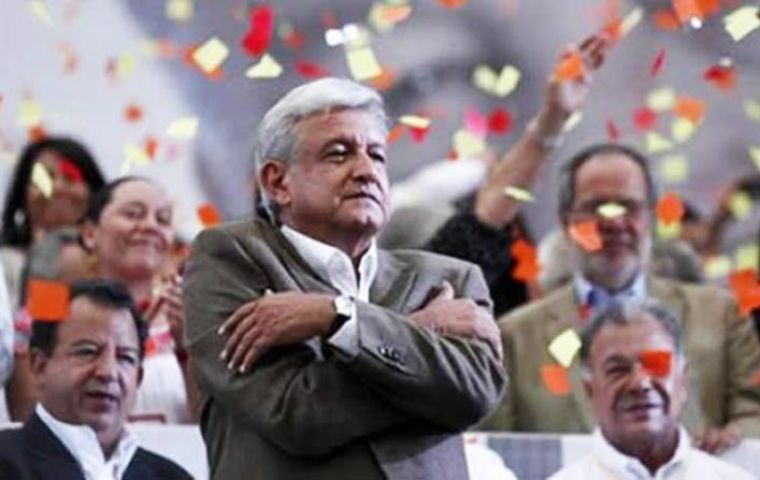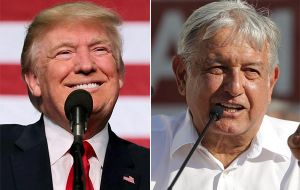MercoPress. South Atlantic News Agency
Landslide win for México's Lopez Obrador who pledged battle the 'mafia of power'; Trump congratulates
 López Obrador’s supporters gathered by the thousands in the Zocalo, Mexico City’s main plaza, chanting the president-elect’s name as mariachis performed.
López Obrador’s supporters gathered by the thousands in the Zocalo, Mexico City’s main plaza, chanting the president-elect’s name as mariachis performed.  López Obrador’s victory represents an emphatic rejection of the traditional politicians whom he regularly calls the “mafia of power.”
López Obrador’s victory represents an emphatic rejection of the traditional politicians whom he regularly calls the “mafia of power.”  Trump tweeted congratulations saying “I look very much forward to working with him. There is much to be done that will benefit both the United States and Mexico!”
Trump tweeted congratulations saying “I look very much forward to working with him. There is much to be done that will benefit both the United States and Mexico!” Andrés Manuel Lopez Obrador, who rallied voters with his battle cry against corruption and promises to the poor, won a resounding victory Sunday night in Mexico’s presidential election, after the concession of his two top rivals. The victory makes him the first left-oriented president since Mexico began its transition to democracy more than 30 years ago.
López Obrador triumphed with a party that didn’t exist at the time of the last election, against opponents from two parties that have ruled Mexico for nearly a century. The 64-year-old former mayor of Mexico City promises to bring his humble lifestyle to the top of a political establishment famous for self-enrichment.
An official “quick count” from a national sampling of ballots showed López Obrador had about 53% of the vote, according to the national electoral agency. That put him far ahead of his main opponents, Ricardo Anaya and José Antonio Meade, who conceded and offered their congratulations.
López Obrador’s supporters gathered by the thousands Sunday night in the Zocalo, Mexico City’s main plaza, chanting the president-elect’s name as mariachis performed.
López Obrador’s victory represents an emphatic rejection of the traditional politicians whom he regularly calls the “mafia of power.” In recent decades, Mexico has been led by technocrats and pro-American politicians, while López Obrador’s role models are Mexican independence and revolutionary leaders who stood up to more powerful foreign countries.
President Donald Trump loomed in the background of this vote. He was not a wedge issue in the election — all candidates opposed his immigration and trade policies and his anti-Mexican rhetoric — but the new Mexican president will have to manage cross-border relations that are unusually fraught.
Trump tweeted his congratulations to Lopez Obrador on Sunday night, adding: “I look very much forward to working with him. There is much to be done that will benefit both the United States and Mexico!”
Héctor Vasconcelos, who is expected to serve as foreign minister, said in an interview that the candidate’s team was “very conscious of the enormity of the challenge. But someone has to try to turn this country toward profound change.”
López Obrador’s opponents sought to portray him as a dangerous populist who would lead Mexico back to failed economic models involving subsidies and state intervention, while provoking more tension with the Trump administration.
But the unpopularity of president Enrique Peña Nieto and his Institutional Revolutionary Party — which ruled Mexico for most of the past century — hobbled the candidate from the long-dominant party and prompted voters to search for an alternative to traditional political candidates. (Peña Nieto did not run; Mexican presidents are limited to one term.)
López Obrador’s supporters attributed his victory to the longevity and personal charisma of a candidate who was running in his third consecutive presidential election and has campaigned in every municipality in the country. His message has remained largely consistent — eradicate corruption, invest in the poor, fight inequality — but got a warmer reception this year because of mounting frustration after a series of scandals in Peña Nieto’s administration and the ever-growing drug-war violence.
López Obrador grew up in a middle-class family in the Gulf Coast state of Tabasco and began his political career helping indigenous villagers with public works projects, which exposed him to Mexico’s glaring inequality. He broke away from the PRI in the late 1980s and joined a leftist opposition party. López Obrador grew famous as a leader of protests against voter fraud and the abuses of the state-owned oil industry.
López Obrador had only one prior electoral victory. In 2000, he became mayor of Mexico City, where he boosted social spending for single mothers, the handicapped and the elderly. Major projects, such as an elevated highway through the city, and the revitalization of downtown neighborhoods, also boosted his popularity.
After two failed presidential bids, López Obrador, whose nickname is AMLO, has tempered his message this year. While he still emphasizes the fight against extreme poverty, saying it will lead to less violence and a stronger economy, he has portrayed himself as more pro-business and pro-American than in the past. His critics worry he will roll back a recent reform to allow private investment in the oil industry and cancel a multibillion-dollar airport project in Mexico City.
López Obrador, who heads the National Regeneration Movement, or Morena, says he plans to cut government personnel and salaries and prevent funds from being squandered through corruption. He intends to use those resources to boost social programs for the poor. Corruption experts express skepticism about whether this plan is realistic.
Sunday’s elections were the largest in Mexico’s history, with voters filling more than 3,200 positions at all levels of government. Among these were 628 members of the National Congress who will be able to be reelected for the first time in nearly a century, eight state governors and mayors of more than 1,500 cities, including Mexico City.
The campaign season has been marked by violence, with some 130 candidates and campaign staff assassinated across the country.
López Obrador’s Morena is hoping to capture a majority in the congress, which would be a remarkable rise for a party he founded four years ago.
“This is a historic day,” López Obrador said as he voted Sunday. “We represent the possibility of a real change, of a transformation.”




Top Comments
Disclaimer & comment rules-

-

-

Read all commentsA good change for Mexico. I hope that many of the changes get implemented.
Jul 04th, 2018 - 12:15 pm +1Will have a good chance to see when I spend 3 months in Mexico for my summer break!
El Think is very happy about this...
Jul 02nd, 2018 - 09:17 am 0I hope he's able to do what he promises and reduce the violence and corruption in Mexico.
Jul 02nd, 2018 - 11:25 am 0Commenting for this story is now closed.
If you have a Facebook account, become a fan and comment on our Facebook Page!